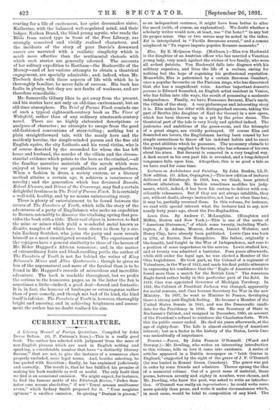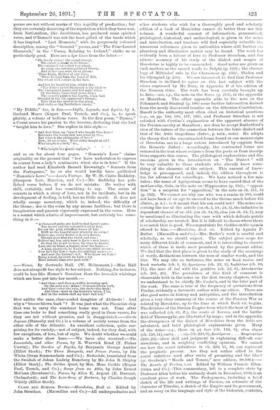POETRY. —Poems. By John Francis O'Donnell. (Ward and Downey.)—Mr. Dowling,
who writes an interesting introduction to this volume, tells us how it came into existence. A series of articles appeared in a Dublin newspaper on " Irish Graves in England," suggested by the sight of the grave of J. F. O'Donnell (he was buried in Kensal Green Cemetery). The grave was put in order by some friends and admirers. Thence sprang the idea of. a memorial volume. Out of a great mass of material, these poems, between seventy and eighty in number, were chosen, and Mr. Dowling, who knew the poet, was asked to write an introduc- tion. O'Donnell was really an intprovisatore ; he could write verse more quickly than prose, and write it under circumstances which, in most cases, would be fatal to composition of any kind. • The
poems are not without marks Of this rapidity of production; but they are certainly deserving of the reputation which they have won. Irish Nationalism, like Jacobitism, has produced some spirited verse, and O'Donnell was not the least gifted of the bards which it has inspired. "Last Moments," with its gorgeously coloured description, among the "General " poems, and " The Four-Leaved Shamrock," in the " Poems Relating to Ireland," strike us as particularly good. Here are a fgw lines from the latter
"Oh, lovely vision! the round throat, The cheek, a innSiC in its bloom ! The sundered locks that test afloat, . As sways the autumn-goldened hrooin, And in her eyes snch vio'et gloom! 'Twas Erinn, Mother of our liace, 'Twas Ireland from the Land of Bid, The sweet wild sorrow in her face.
And low he humbled him, whilst she : The Four-I eared Shamrock is thy blade- The crossg.uard points and hilt make three Of the brave loaves that never fade ; The sWord's point is the fourth, when laid Straight at the rile oppressor's throat ; Take thou the symbol in thy grasp And smite as thy forefathers smote.' "
" My Fiddle," too, is fine.-Idylls, Legends, and Lyrics, by A, Garland Mears (Kegan Paul, Trench, and Co.), is, to speak plainly, a volume of tedious verse. In the first poem, " Ilamea," a Count avows his passion to the heroine, declaring that she had "taught him to love." She replies in this style :-
" And dost thou say 'twas I who taught thee Love ? Methinks the lesson first was given by theo. But what is the philosophy of love ?
Now, let us reason. Were either taught at all ? Who taught tte lark," &c., " Who taught the gentle zephyrs,"
and so on for about four pages. "Honoria's Love" claims originality on the ground that " few have undertaken to express in sonnet form a lady's sentiments when she is in love." If the author had read Elizabeth Barrett Browning's " Sonnets from the Portuguese," he or she would hardly have published " Honoria's Love."-Love's Vintage. By W. St. Claire Baddeley. (Sampson Low, Marston, and Co.)-Mr. Baddeley has pub- lished verse before, if we do not mistake. He writes with skill, certainly, and has something to say. The series of sonnets in which a story of love, not in its incidents, but in its development of feeling, is told, has no little merit. It does not wholly escape monotony, which is, indeed, the difficulty of the theme ; tior is the verse by any means faultless ; but there is imagination and passion -vigorously expressed in the verse. Here is a sonnet which admits of improvement, but certainly has some- thing in it :-
" A thousand paths are held to find Love's gate; The desert and the cornfield lead to him. Do not the grim rebuffing waves of fate Drift us the hopeful spar whereby we swim ? Believe me, every flower is Love's flower, Though poet sing the violet and rose ; Believe me, too, each hour is Love's own hour ;
So that the heart be true, his time he knows. Love can be blind, a beggar, want for house ; - A king, disguised, he wanders the thick streeti ; Now he's the lion ;-now, the nibbling mouse ;- And now the hunter's net. Who know his feats? Being a God, forsooth he bath a wit More infinite than ever poet writ."
-Verses. By Gertrude Hall. (W. Heinemann.)-Miss Hall does not always fit her style to hei subject. Nothing, for instance, could be less like Homer's Nausicaa than the love-sick whinings -which are here put into her mouth :- "And then-and then a swiftly lessening spot On the grey sea-Adieu! 0 breeze-blown bark, And then-over the ruin, the dark-the dark ! And then-here at the fountain brink, I lie, And in the waters chill my tears fall hot."
How unlike the sane, clear-souled daughter of Alcinotts ! And why a " breeze-blown bark "? It was just what the Pluea,cian ship that was to carry the wanderer home was not. Time after time one looks to find something really good in these verses, for they are not without promise, and is disappointed.-Garde Joyeuse (Stanesby and Co.) is a volume of society verses from the -other side of the Atlantic. An excellent collection, quite sur- prising for its variety,-not of subject, indeed, for they deal, with few exceptions, of love, but of style. We doubt whether we could make a better show here.-We have also received :-The Immortals, and other Poems, by R. Warwick Bond (T. Fisher Unwin) ; The Garden of Psyche, by Benjamin George Ambler (Elliot Stock); The Three Banquets, and Prison Poems, by Ida White (Swan Sonnenschein and Co.) ; Nad,eschda, translated from the Swedish of Johan Ludvig. Rtuteberg by Mr. John B. Shipley (Elliot Stock) ; The Golden Quest, by Mrs. Moss Cockle (Kegan Paul, Trench, and Co.) ; Songs from an Attic, by John Ernest McCann (Brentano's) ; Poems, by Alice E. Argent (E. Durrant, Chelmsford) ; and The Love-Song of Barbara, by Charles Joseph Whitly (Elliot Stock).



































 Previous page
Previous page